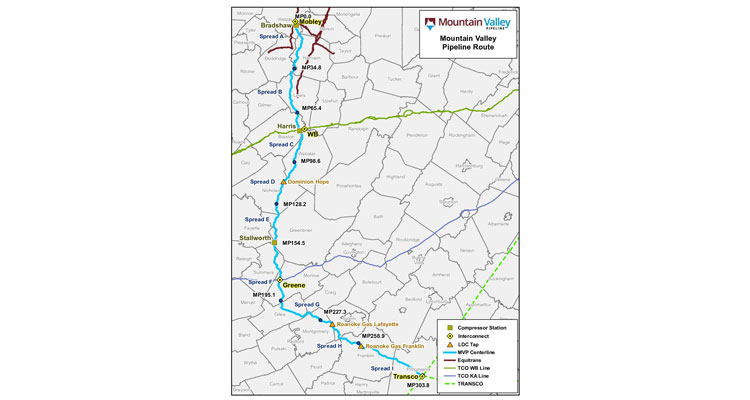(Undated) — The Mountain Valley Pipeline went into service Friday morning, ending a decades-long construction process, punctuated by multiple regulatory agency rulings and state and federal court challenges.
“After satisfying all applicable legal and regulatory requirements, including all applicable in-service conditions of the U.S. Pipeline and Hazardous Materials Safety Administration’s Consent Agreement for the project, and receiving all
remaining approvals from the Federal Energy Regulatory Commission. MVP is now available for interruptible or short-term firm transportation service until long-term firm capacity obligations commence on July 1, 2024,” said Equitrans spokesperson Natalie Cox. Equitrans is the lead developer on the 303-mile long pipeline.
“This is an important and long-awaited day for our Nation and the millions of Americans who now have greater access to an abundant supply of domestic natural gas for use as an affordable, reliable, and cleaner energy resource,” said Diana Charletta, president and chief executive officer of Equitrans Midstream Corporation. “Natural gas is an essential fuel for modern life, and, as a critical infrastructure project, the Mountain Valley Pipeline will play an integral role in achieving a lower-carbon future while helping to ensure America’s energy and economic security for decades to come.”
MVP is designed to provide cost-effective access to natural gas for use by local distribution companies, industrial users, and power generation facilities in the growing demand markets of the mid-Atlantic and Southeast regions of the United States. The 42-inch diameter underground interstate natural gas transmission pipeline is designed to carry up to 2 Bcf of natural gas per day from the Marcellus and Utica shale production regions to these demand markets.
“We are grateful for the ongoing professionalism and tremendous efforts of the federal and state agencies that worked tirelessly for many years to ensure MVP’s construction activities met or exceeded all applicable permitting requirements,” said Thomas F. Karam, executive chairman, Equitrans Midstream Corp. “In addition, we would not be commencing commercial operations were it not for the relentless advocacy and commitment of our federal and state elected officials. In particular, the resolve and commitment of (West Virginia) Senator (Joe) Manchin who championed and declared MVP as being critical to our energy security and national security, and the dedication of Senator Capito, Congressman Reschenthaler, and Congresswoman Miller who recognized the essential benefits of MVP, including reliable, affordable access to domestic energy.”
The MVP is now part of a network of more than 300,000 miles natural gas transmission pipelines. Natural gas is recognized by the U.S. Energy Information Administration as the most affordable option for residential energy.
“Demand for natural gas in Southwest Virginia continues to grow, and the importance of MVP’s energy supply cannot be overstated,” said Paul Nester, president and chief executive officer of Roanoke Gas Co. “The MVP and its natural gas supply are essential to meeting the needs of residents and businesses across the Roanoke Valley, now and for many years to come. Further, MVP’s delivery points to Roanoke Gas in Franklin and Montgomery Counties are certain to provide direct, long-term economic benefits to our community and this region.”
The final price tag will be nearly eight billion dollars. That’s more than double the original estimates made in 2013 when the project was first announced.
A congressional budget compromise last year removed all of the legal challenges that had been filed against the project. On two separate occcasions, the Fourth Circuit Court of Appeals in Richmond rescinded all federal permits that had been granted to the pipeline, forcing developers to essentially go back to the drawing board.
In 2022, West Virginia Senator (D) Joe Manchin agreed to support the Inflation Control Act in exchange for a bill ordering agencies to allow construction of the pipeline. When that effort failed, Manchin sponsored an amendment to the National Defense Authorization Act that would have exempted the Pipeline from normal permitting processes. That effort failed in a Senate vote.
Last year, Congress signed off on a debt ceiling deal which included a Manchin provision to fast-track completion of the pipeline. It effectively ended all existing legal challenges. Environmental groups claimed Congress violated the Constitution’s separation of powers doctrine by overruling courts.
“Since the project’s inception in 2014, Mountain Valley has worked closely with state and federal agencies that invested countless hours and worked diligently to develop comprehensive plans for constructing the pipeline,” Cox said in a Friday press release. “In accordance with all permit requirements, the MVP was built under unprecedented regulatory oversight and followed stringent construction, safety, and environmental protocols, including the protection of threatened and endangered species, and cultural, historical, and environmental resources. Construction of the MVP required thousands of skilled workers, who demonstrated unwavering commitment and perseverance to complete the project and begin delivering natural gas to customers.”
